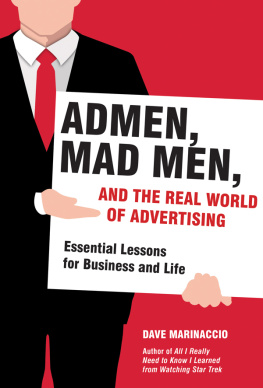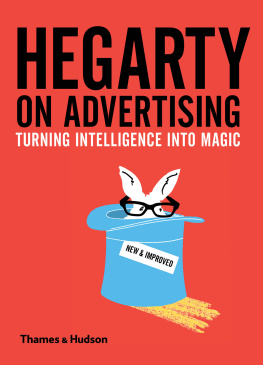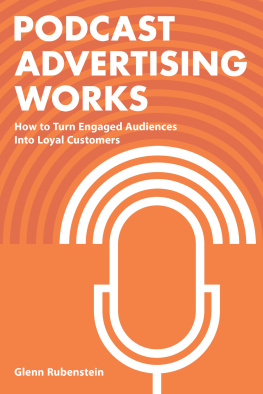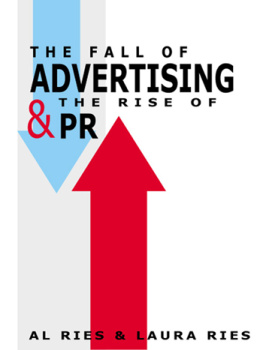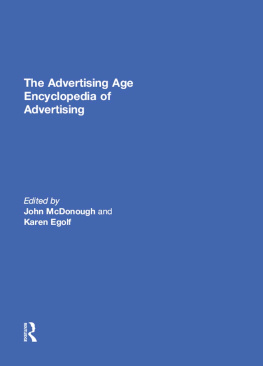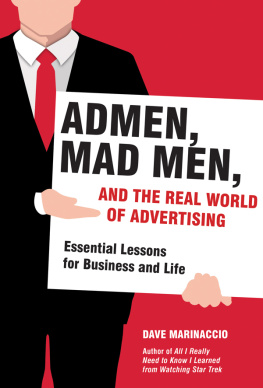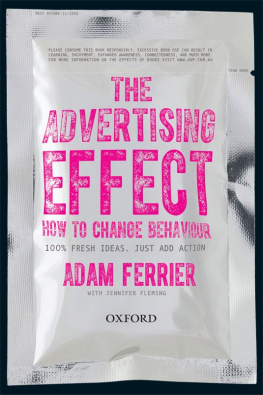Also by Dave Marinaccio:
All I Really Need to Know I Learned from Watching Star Trek
Copyright 2015 by Dave Marinaccio
All rights reserved. No part of this book may be reproduced in any manner without the express written consent of the publisher, except in the case of brief excerpts in critical reviews or articles. All inquiries should be addressed to Arcade Publishing, 307 West 36th Street, 11th Floor, New York, NY 10018.
First Edition
Arcade Publishing books may be purchased in bulk at special discounts for sales promotion, corporate gifts, fund-raising, or educational purposes. Special editions can also be created to specifications. For details, contact the Special Sales Department, Arcade Publishing, 307 West 36th Street, 11th Floor, New York, NY 10018 or .
Arcade Publishing is a registered trademark of Skyhorse Publishing, Inc., a Delaware corporation.
Visit our website at www.arcadepub.com.
Visit Dave Marinaccios author page on Facebook.
10 9 8 7 6 5 4 3 2 1
Library of Congress Cataloging-in-Publication Data
Marinaccio, Dave.
Admen, mad men and the real world of advertising : essential lessons for business and life / Dave Marinaccio. First edition.
pages cm
Includes index.
ISBN 978-1-62872-572-8 (hardcover : alk. paper); ISBN 978-1-62872-621-3 (ebook)
1. Marinaccio, Dave. 2. Advertising executivesBiography. 3. Advertising. 4. Marketing. I. Title.
HF5810.M375A3 2015
659.1092dc23
[B] 2015023965
Cover design execution by Janette Kim
Cover illustration: Shutterstock
Printed in the United States of America
For Al, father, dreamer, Navy man
Special Thanks
Jim Herwitz, Danny Vermillion, Paul Mahon, Carol Mann, Doug Laughlin, Chris Laughlin, Scott Laughlin, Ron Owens.
Contents
Introduction
W OMEN DO NOT BUY Redbook because its filled with douche ads. No one turns on their computer to scan banners. Folks do not watch television to see the Orkin man.
Advertising is an intrusion. An unwanted interloper. A necessary evil. Its the price we pay for television production and to hold down the cost of FiOS. It is the intersection of free speech and free enterprise.
Guess how many advertising impressions the average American receives every day. Go ahead, Ill wait.
The answer is over three thousand. Way over. Every single one of us is bombarded by over three thousand TV spots, radio commercials, billboards, print ads, product packages, bottle labels, car logos, store signs, internet banners, phone apps, pop-ups, social media channels, et cetera. Thats three thousand advertising impressions each and every day. It gives new meaning to the phrase ad infinitum.
Nothing could make me happier. I make my living writing ads. For the past thirty years I have created ads for Pizza Hut, McDonalds, Kraft, Oscar Mayer, Ford, Gillette, IKEA, the National Guard, NAPA, the American Dairy Association, the Weather Channel, Sunkist, MCI, Verizon, Schlitz, Michelob and over a hundred more.
Ive worked for agencies big and small, from international giants like J. Walter Thompson to little family-owned shops, to my own place, LMO Advertising. The M in LMO stands for Me.
I didnt start out as an adman. After graduating from the University of Connecticut, I took a job with the state Department of Mental Health. We werent in advertising, but we had a slogan. According to a coworker, we were Committed people committed to committed people.
The Department of Mental Health is actually a great place to apprentice for a career in advertising. Working with mentally disabled adults forces you to keep things simple. Communication must be focused and clear. Being positive and upbeat enhances responses to your message. These lessons have served me well.
Of course, once employed by an ad agency, I learned other lessons. The most basic one was this: advertising is not created to sell products to consumers. It is created to sell advertising to clients of advertising agencies. That is how we make our money.
Common sense dictates that we work this way. No consumer will ever see an ad if a client doesnt purchase it. So advertising that appeals to the client firstand the consumer secondis at the top of an agencys agenda.
Sometimes the consumer never enters into it. A brand manager may need to solve a political problem. Or the ad might be targeted at a competitor. On occasion, the brand manager just wants to work with a certain television director or impress his girlfriend. Alas, this is more common than the advertisers or agencies like to believe.
When I worked on King Edward Cigars, our media director found television programming that perfectly matched the King Edward demographic. There was one small problem. The president of King Edward Cigars refused to advertise on the show.
The show was professional wrestling. El Presidente didnt want anything to do with wrestling. He considered it lowbrow. Never mind that most of the cigars we were selling had a price point of around a nickel.
He suggested we purchase time on the World Series. The series is an extremely expensive media buy. He could have bought a much larger wrestling package for the few spots we aired on the series. Didnt matter.
How did he come to this decision? My guess is that he didnt want to tell his friends that he was sponsoring wrestling. The World Series is a prestigious event. Our respected and beloved client was more concerned with his self-image than he was about selling cigars.
So did the agency buy time on the World Series and take the media commission? Did Monet paint water lilies? You can also bet that everybody on the account told their friends to look for our King Edward spots on the World Series.
Of course, when the World Series ended the baseball fans ran into the streets, turned over cars and set them ablaze. Perhaps they used those flaming cars to light their King Edward cigars. Irony can be pretty ironic. I cant imagine wrestling fans ever acting this lowbrow.
Anyway, when you hear that advertising is a science, take it with a truckload of salt. People are involved, and people make strange choices.
Although this is manifestly an advertising book, it is written from many different perspectives. Anyone who works in a business environment should find it useful. There are sections on being a good client, a good boss, a good underling and a good vender. It also functions as a survival guide for navigating the corporate maze. Other parts are just interesting stories or observations.
As you get into the guts of this book, youll realize that working in advertising for so many years has made it difficult for me to write long-format pieces. Thirty-second television commercials are more my milieu. Hence, the chapters in this book are extremely short. They are bite size, like McNuggets, and hopefully as tasty.
Like most copywriters, my mind is chaotic and prone to tangents. I have succumbed to those tendencies in this book. The chapters dont follow a prescribed order. They were written as they came to me. Each is like a stroke in an Impressionistic painting: when you view them together, you will understand the whole.
So, welcome to my world. I can describe advertising only as Ive seen and experienced it. I promise to be honest with youat least as honest as you can expect an adman to be. And I sincerely hope you will find this book nearly as amusing as Ive found my career.
Thats going to leave a mark

